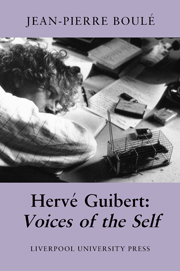Book contents
- Frontmatter
- Contents
- Acknowledgements
- List of Abbreviations
- Introduction
- 1 Youthful Writings
- 2 Photographic Writing
- 3 Towards the Novel
- 4 Image and Text
- 5 The ‘Novel’
- 6 ‘Autobiography’
- 7 Towards the roman faux
- 8 The roman faux
- 9 Thanatographical Writing
- 10 The Fictitious, the Fake or the Delirious
- Conclusion
- Notes
- Bibliography
- Index of Names
- Index of Notes
10 - The Fictitious, the Fake or the Delirious
- Frontmatter
- Contents
- Acknowledgements
- List of Abbreviations
- Introduction
- 1 Youthful Writings
- 2 Photographic Writing
- 3 Towards the Novel
- 4 Image and Text
- 5 The ‘Novel’
- 6 ‘Autobiography’
- 7 Towards the roman faux
- 8 The roman faux
- 9 Thanatographical Writing
- 10 The Fictitious, the Fake or the Delirious
- Conclusion
- Notes
- Bibliography
- Index of Names
- Index of Notes
Summary
I discussed Cytomégalovirus in the last chapter despite the fact that it appeared after Guibert's death, since it formed part of the project of thanatographical writing. With the three books left for me to study, Guibert is in my view still committed to the project of the voices of the self, so their thematic will be that of the body and death also. Of note, too, is the fact that the three bear the label ‘roman’ (‘novel’), with a variant for Mon valet et moi. The only difference from the three other works published since Á l'ami is that, as we shall see, Guibert tries to tear himself away from his illness and seek refuge in writing. But it is not ‘le divertissement’ (in the Pascalian sense of ‘spiritual nonchalance’) that Guibert is after: by means of subterfuge (the fictitious, the fake or the delirious), he will still manage to put his self down on paper and ‘écrire jusqu'au bout' (‘write to the bitter end’).
MON VALET ET MOI
Published in September 1991, Mon valet et moi was the last book to appear in Guibert's lifetime. It bears the generic subtitle ‘roman cocasse’ (‘comical novel’). The strangeness is to be found in the story that is told: a master aged 80, an incontinent author of boulevard stage successes, describes his relationship with his manservant, a 20-year-old screen actor who has made only one film.
- Type
- Chapter
- Information
- Hervé GuibertVoices of the Self, pp. 235 - 264Publisher: Liverpool University PressPrint publication year: 1999

